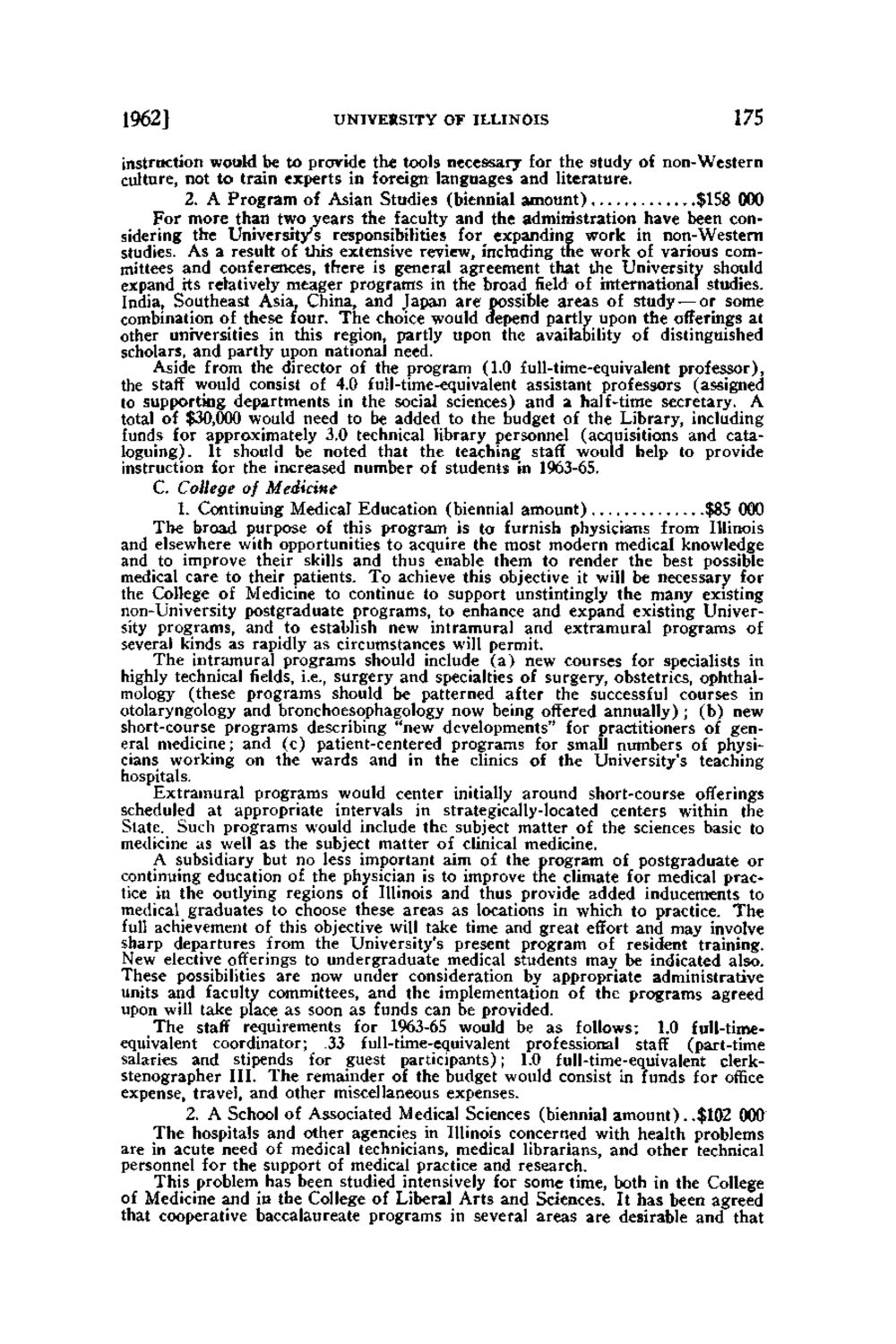| |
| |
Caption: Board of Trustees Minutes - 1964
This is a reduced-resolution page image for fast online browsing.

EXTRACTED TEXT FROM PAGE:
1962] UNIVERSITY OF ILLINOIS 175 instruction would be to provide the tools necessary for the study of non-Western culture, not t o train experts in foreign languages and literature. 2. A P r o g r a m of Asian Studies (biennial amount) $158 000 For more than two years the faculty and the administration have been considering the University's responsibilities for expanding work in non-Western studies. As a result of this extensive review, including the work of various committees and conferences, there is general agreement that the University should expand its relatively meager programs in the broad field of international studies. India, Southeast Asia, China, and Japan a r e possible areas of study — or some combination of these four. T h e choice would depend partly upon the offerings at other universities in this region, partly upon the availability of distinguished scholars, and partly upon national need. Aside from the director of the program (1.0 full-time-equivalent professor), the staff would consist of 4.0 full-time-equivalent assistant professors (assigned to supporting departments in the social sciences) and a half-time secretary. A total of $30,000 would need to be added to the budget of the Library, including funds for approximately 3.0 technical library personnel (acquisitions and cataloguing). It should be noted that the teaching staff would help to provide instruction for the increased number of students in 1963-65. C. College of Medicine 1. Continuing Medical Education (biennial amount) $85 000 The broad purpose of this program is to furnish physicians from Illinois and elsewhere with opportunities to acquire the most modern medical knowledge and to improve their skills and thus enable them to render the best possible medical care to their patients. T o achieve this objective it will be necessary for the College of Medicine to continue to support unstintingly the many existing non-University postgraduate programs, to enhance and expand existing University programs, and to establish new intramural and extramural programs of several kinds as rapidly as circumstances will permit. T h e intramural programs should include ( a ) new courses for specialists in highly technical fields, i.e., surgery and specialties of surgery, obstetrics, ophthalmology (these programs should be patterned after the successful courses in otolaryngology and bronchoesophagology now being offered annually) ; (b) new short-course programs describing "new developments" for practitioners of general medicine; and (c) patient-centered programs for small numbers of physicians working on the wards and in the clinics of the University's teaching hospitals. Extramural programs would center initially around short-course offerings scheduled at appropriate intervals in strategically-located centers within the State. Such programs would include the subject matter of the sciences basic to medicine as well as the subject matter of clinical medicine. A subsidiary but no less important aim of the program of postgraduate or continuing education of the physician is to improve the climate for medical practice in the outlying regions of Illinois and thus provide added inducements to medical graduates to choose these areas as locations in which to practice. T h e full achievement of this objective will take time and great effort and may involve sharp departures from the University's present program of resident training. New elective offerings to undergraduate medical students may be indicated also. These possibilities are now under consideration by appropriate administrative units and faculty committees, and the implementation of the programs agreed upon will take place as soon as funds can be provided. T h e staff requirements for 1963-65 would be as follows: 1.0 full-timeequivalent coordinator; .33 full-time-equivalent professional staff (part-time salaries and stipends for guest participants); 1.0 full-time-equivalent clerkstenographer I I I . T h e remainder of the budget would consist in funds for office expense, travel, and other miscellaneous expenses. 2. A School of Associated Medical Sciences (biennial a m o u n t ) . .$102 000 T h e hospitals and other agencies in Illinois concerned with health problems are in acute need of medical technicians, medical librarians, and other technical personnel for the support of medical practice and research. This problem has been studied intensively for some time, both in the College of Medicine and in the College of Liberal A r t s and Sciences. It has been agreed that cooperative baccalaureate programs in several areas are desirable and that
| |